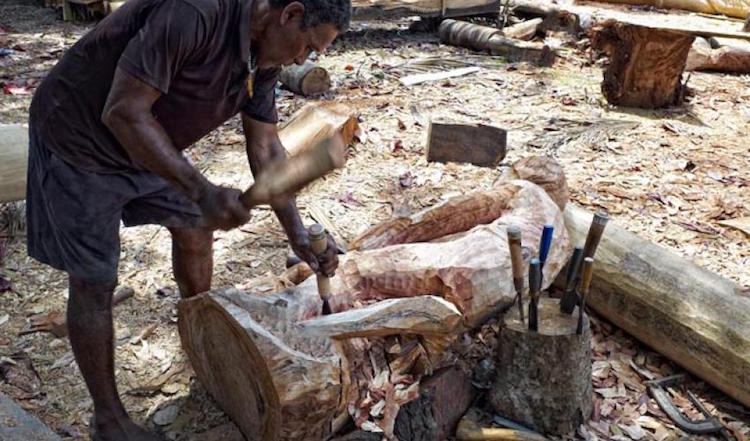This is the first in a series of features on the South Pacific produced in collaboration with Wansolwara, an independent student newspaper of the University of the South Pacific.
SUVA, Fiji (IDN) – Two women’s rights activists have raised alarm bells about the need to protect Solomon Island children, especially girls, from being exploited by foreigners, who are involved in the South Pacific island nation’s logging industry.
The activists, Sister Doreen Awaiasi and Lynffer Maltungtung, say there are countless incidents in which under-age girls and young women are given to foreigners by their parents, or are lured by riches, but not much is being done to stop these or to educate the locals against engaging in such illegal acts.
The two, who were in Fiji in August 2106 for a regional training workshop, said most of the foreigners involved worked in the logging industry. Sister Awaiasi, who runs the Christian Care Centre, says the number of such cases was shockingly high.
“Many girls whom we investigated, reported that the (loggers) lured them to the logging camps with slippers, combs, and mostly cash,” she said. “I think girls are too young to understand the consequences of this type of issue, they are there just entirely there for financial favours, and in some cases parents also allow their daughter to be married off to the loggers.”
According to the Solomon Islands government, logging is the primary export, accounting for around 60 percent of export earnings and constituting 17 percent of the economy and 16 percent of government revenue. Logging industry largely employs foreign men, predominantly from Asia.
A U.S. State Department report released in 2015 on ‘Trafficking in Persons’ acknowledges the problem in the Solomon Islands’ primary industries. It said, local children are subjected to prostitution and forced labour within the country.
“Children are subjected to prostitution, sometimes in exchange for money or fish, particularly near foreign logging camps, on foreign and local commercial fishing vessels, and at hotels and entertainment establishments,” it noted, adding, “some parents sell their children to foreign workers at logging and mining companies for marriage; some of these girls are later forced into domestic servitude and prostitution.”
Sister Awaiasi said that in one incident, a 13-year-old asked them for help because her parents were forcing her to marry a logger.
“At that time she was in high school, she told us that she had future plans in her education but her parents told her that their family will be financially secure if she marries the (logger),” added sister Awaiasi.
She said there were many young single mothers as a result of this because many of the loggers return to their home countries when their contracts end.
Most logging operations in Solomon Islands are done by Malaysian and sometimes Korean firms, and many of the logs are exported to China.
Maltungtung, who works with the Family Support Centre in the Solomon Islands capital Honiara, says while locals are aware that the exploitation continues, most do not consider it to be a serious matter.
“It’s happening before our eyes but people are very reluctant to take a stand and put an end to this,” she said. “There are three forms of trafficking in the country; they are child trafficking, labour exploitation, and commercial sexual abuse, this mostly happens in the logging camps.”
She said her organisation has been working with police for the past 14 years to provide legal assistance to victims in such cases.
“In some of the cases we intervened and retrieved the girls,” she said adding that there were also cases in which underage girls, driven by poverty, would go on their own accord.
“For example, there was this case of a parent who approached asking us for help. The parent told us that her daughter followed a fishing vessel, so we quickly searched for the boat and we located it in Temotu Province, so we were able to get that girl out,” said Maltungtung. “The girl went on consent but what we were worried about is that she was too young.”
In 2015, Save the Children Fund conducted a baseline assessment on 500 households of children at risk of exploitation in areas where logging and fishing industries were active. Sister Awaiasi says the study was conducted in parts of the country where logging was heavy.
The study discovered that issues such as child labour, child marriage, informal adoption and sexual abuse of children were interconnected and linked to the logging industry. The majority of these children are being married to loggers at a very young age, most of them between the ages of 13 to 17 years.
Sister Awaiasi says they also conducted a survey in 2007 that identified poverty as a major factor, especially for parents who choose to use their child as a commodity.
“I believe to address this issue, it’s not only the government’s job, but all Solomon Islanders must recognise and deal with this issue,” she argues. “Church leaders and community leaders or chiefs must also look at this issue with serious consideration.” – Reported by: Lowen Sei. [IDN-InDepthNews – 20 September 2016]
Photo: A wood carver in Solomon Islands. Credit: IUCN | Stuart Chape.
IDN is flagship agency of the International Press Syndicate.

